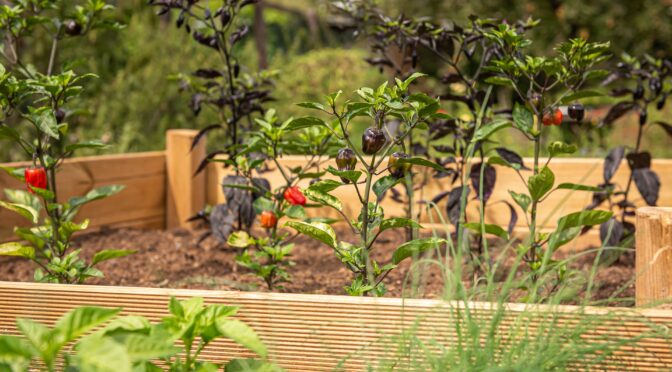Raised beds have become a very popular. Some people may use them because they’re attractive but they also have several advantages. However, before you invest in the effort of creating raised beds here are a few pros and cons to help determine if they’re right for your garden.
Pros of Raised Beds
There are many advantages to using raised beds.
They warm up quickly in the spring.
They’ll be ready for planting before traditional garden beds. They’re great for heat loving plants like eggplants and peppers.
They drain well.
Many people find raised beds work well for them in wet climates particularly if they normally deal with heavy, clay soil. If your area experiences heavy spring rains having well-drained raised beds can help you get crops in on time. They’re also well suited for crops like summer squash that don’t thrive with wet feet.
You can put them anywhere.
One of the best things about raised beds is that they can be set up in places you couldn’t normally garden. You can grow on rooftops, old parking lots, or just places with poor soil. Note, if you’re using them to grow somewhere with contaminated soil make sure you seal the base of the bed with something.
They can be more accessible.
For people who have trouble gardening in traditional beds, raised beds can allow them to garden. They can be built on sturdy legs to accomodate folks in wheelchairs or those who have trouble bending over.
They can help prevent weeds.
While raised beds won’t eliminate the need to weed entirely, they can help reduce them.
Raised beds are perfect for root crops.
If you live in an area with heavy clay soils or have heavily compacted soil, growing root vegetables can be a challenge. Filling raised beds with compost and soil can allow you to grow perfect carrots, radishes, beets, and more!
Cons of Raised Beds
Despite all their advantages there are a few reasons that raised beds aren’t the best choice for everyone.
They dry out quickly.
In hotter, drier climates what seems like an advantage elsewhere can actually become a problem. Raised beds heat up and dry out more quickly. If you live in an area where you need to conserve water, a raised bed may not be the best choice.
You’ll have to purchase/find materials.
Depending on your circumstances and what you want your beds to look like. You may need to buy materials like lumber, screws, and soil or compost. Alternatively, you could use logs from your own property or weave walls with flexible sticks.
They require maintenance.
Unless you build your beds from stone or brick, your raised beds will most likely require maintenance and repair over the years. Boards and logs will rot and metal will rust. While it may seem like a good idea to use old railroad ties or pressure treated lumber these can leach chemicals into the soil and should be avoided.
Most raised beds cannot what be tilled.
Unless you make very large beds you probably won’t be able to use a tiller in them. You can use a broad-fork or garden fork instead.
Take these features into consideration as you determine whether raised beds are the right choice for your garden.

